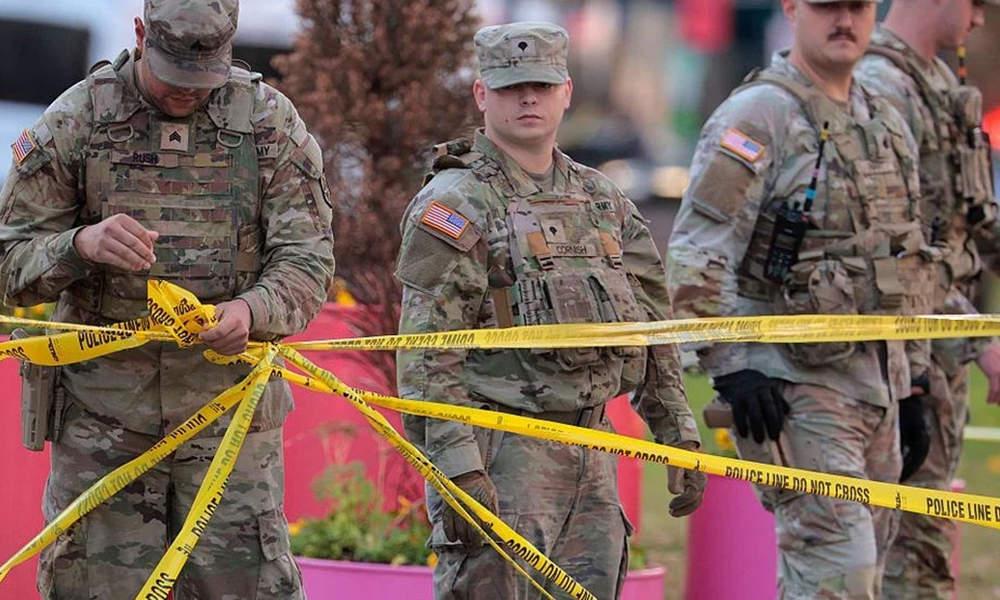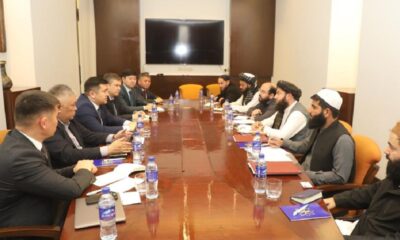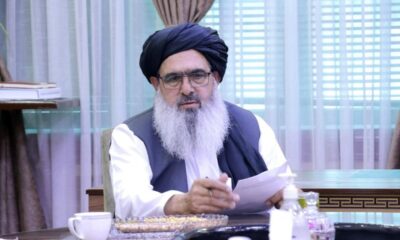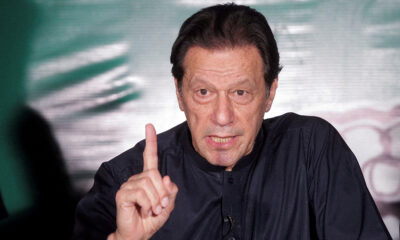Latest News
Biden’s remarks an ‘acknowledgement’ of no armed groups in Afghanistan: IEA

The Islamic Emirate of Afghanistan on Saturday said it considers remarks by President Joe Biden on the issue of al-Qaeda in Afghanistan as the US leader acknowledging that no armed groups exist in the country.
In a tweet early Saturday, the IEA’s ministry of foreign affairs’ spokesman Abdul Qahar Balkhi said: “We consider remarks by US President Joe Biden about non-existence of armed groups in Afghanistan as acknowledgment of reality & state that it refutes the recent report by UN Sanctions Monitoring Team alleging the presence & operation of over twenty armed groups in Afghanistan.”
“The Islamic Emirate maintains the policy of not allowing anyone to use the soil of Afghanistan to harm others. Our actions in this regard are not due to the requests or support of anyone, including America,” he said.
The comments come in the wake of the release of a US intelligence report that was declassified and released this week titled ‘Prospects for al-Qaeda in Afghanistan and Globally Through 2024’.
The report issued by the Director of National Intelligence, which serves as the head of the US Intelligence Community, did not however say al-Qaeda was not present in the country, but rather that the US foresees al-Qaeda prioritizing its sanctuary over conducting operational activity in Afghanistan during the next two years.
“We do not assess that al-Qaeda has the personnel, infrastructure, or unique capabilities to pose a threat to the United States from Afghanistan at this point,” the report read.
The document also pointed out that it was likely al-Qaeda would shelter a few leaders and conduct other activities in Afghanistan, such as media production, recruitment, facilitation, and training that have the potential to enable or inspire attacks elsewhere.
However, the group’s trajectory in Afghanistan will continue to depend on the IEA and its ability to enforce restrictions, the report stated.
The report also stated that al-Qaeda has little infrastructure in place in Afghanistan but that it could rely on the attack capabilities its affiliates in the Middle East and Africa possess.
“Al-Qaeda leaders will choose not to jeopardize their use of Afghanistan, which is one of only a few viable locations for leadership refuge,” the report said adding that “the Taliban’s (IEA) will and capability to restrict al-Qaeda will be the primary factor that determines the threat emanating from Afghanistan.
“Thus far, the Taliban’s strictures have by and large been observed by al-Qaeda, and we assess that this probably will remain the case during the next two years, as the group recognizes the need for Taliban support to maintain a presence in Afghanistan. Al-Qaeda leaders’ perception of CT pressure also will influence Afghanistan’s appeal as a place where they can live securely.”
Late Friday, a defiant US President Joe Biden, said in answer to a question, on the report, that was shouted out by a journalist as he walked out of a press conference: “Remember what I said about Afghanistan? I said al-Qaeda would not be there. I said it wouldn’t be there. I said we’d get help from the Taliban. What’s happening now? What’s going on? Read your press. I was right.”
With that, Biden turned and left the room – without elaborating.
However, within a few hours, former US special envoy for Afghanistan Zalmay Khalilzad said Biden’s comments “might have relied on the recent National Intelligence Council (NIC) assessment, declassified a few days ago by DNI with some parts redacted.”
In a tweet early Saturday, Khalilzad stated: “I’ve highlighted 3 relevant judgments [noted in the report]:
1. Al Qaeda has little infrastructure in place in Afghanistan.
2. Al Qaeda is unlikely to reconstitute the capability in Afghanistan to direct external operations from the country through 2024.
3. If al Qaeda decides to carry out attacks globally, it can rely on the attack capabilities of its affiliates in the Middle East and Africa.
The release of the Washington reports follows the UN’s recent report that alleges terrorists had “greater freedom of maneuver” in Afghanistan since the IEA reclaimed control in August 2021.
That report stated that the IEA’s link “remains strong and symbiotic” with terrorist groups such as al-Qaeda and the Tehreek-e-Taliban Pakistan (TTP).
“There are indications that al-Qaeda is rebuilding operational capability, that TTP is launching attacks into Pakistan with support from the Taliban, that groups of foreign terrorist fighters are projecting threats across Afghanistan’s borders, and that the operations of ISIL-K (Daesh) are becoming more sophisticated and lethal,” the report said.
IEA spokesman Zabihullah Mujahid said at the time the IEA will not allow anyone to use Afghan territory against other countries.
“The Islamic Emirate emphasizes that the publication of such biased and baseless reports by the Security Council does not help Afghanistan and international peace and security; rather, it increases worry among the people and raises doubts about the independence and impartiality of the United Nations.”
Latest News
Only one of three Afghan suspects was on US terror watch list of 18,000
The Office of the Director of National Intelligence has identified nearly 2,000 Afghans with suspected terror ties and continues to share intelligence with law enforcement agencies.

U.S. authorities are reviewing a classified terror watch list of about 18,000 people after it emerged that only one of three Afghan nationals arrested in recent high-profile cases was on the list, the New York Post reported, citing an intelligence source.
According to the NY Post, the revelation has raised concerns that some suspects may have been radicalized after arriving in the United States. The issue gained renewed attention following last month’s shooting of National Guard members in Washington, DC.
National Counterterrorism Center Director Joe Kent told lawmakers at a December 11 hearing that around 18,000 known or suspected terrorists entered the U.S. over a four-year period under the previous administration. Since then, officials have been combing through the database to assess potential threats and examine how certain individuals were admitted into the country.
Jaan Shah Safi was the only one of three recently arrested Afghan nationals listed in the Terrorist Identities Datamart Environment (TIDE), the U.S. government’s central terror database. Safi, who arrived in the U.S. in 2021 under Operation Allies Welcome, is accused of providing weapons and other support to ISIS-K. U.S. officials say he remains in ICE custody pending removal proceedings.
The other two suspects — Rahmanullah Lakanwal, charged with killing a National Guard member in Washington, and Mohammad Dawood Alokozay of Texas, accused of threatening a suicide attack — were not on the watch list, according to the Post. Intelligence officials cited in the report said this suggests they may have been radicalized after entering the United States.
The Post said the Office of the Director of National Intelligence has identified nearly 2,000 Afghans with suspected terror ties and continues to share intelligence with law enforcement agencies.
The issue has reignited debate over the vetting process used during the rapid evacuation of Afghans in 2021, when more than 100,000 people were brought to the United States.
Lawmakers and officials quoted by the New York Post called for closer scrutiny of those admitted during that period, amid growing political and public concern over national security and immigration policy.
Latest News
Afghanistan signs 30-year deal for marble mining in Daikundi

The Ministry of Mines and Petroleum of Afghanistan has signed a 30-year agreement with a private company to extract marble in Daikundi province.
Under the contract, the company will invest AFN 283 million in exploring and mining marble at the “Mesh-Uliya” site, spanning 16.74 square kilometers in central Daikundi.
Hedayatullah Badri, Minister of Mines and Petroleum, stated that the marble will be processed domestically before being exported abroad. He added that the Mesh-Uliya project is expected to create around 200 jobs, and the company is committed to supporting local communities through social initiatives.
Economic experts highlight that such investments, especially those focusing on domestic processing, are crucial for job creation, boosting exports, and strengthening the national economy. Analysts further note that the project will improve local infrastructure, expand social services, and enhance the economic and social well-being of Daikundi residents.
Since the return of the Islamic Emirate to power, efforts to develop Afghanistan’s mining sector have intensified, with multiple contracts signed in areas including cement, copper, iron, and lapis lazuli, involving both domestic and international companies.
Latest News
Passenger bus veers off Salang Highway, leaving 5 dead, dozens injured
-

 International Sports5 days ago
International Sports5 days agoILT20: Abu Dhabi Knight Riders end Desert Vipers’ unbeaten run in dramatic one-run win
-

 Latest News3 days ago
Latest News3 days agoAfghan border forces prevent illegal entry of hundreds into Iran
-

 Latest News2 days ago
Latest News2 days agoPakistan summons Afghan diplomat over deadly attack in North Waziristan
-

 Latest News3 days ago
Latest News3 days agoJapan allocates nearly $20 million in humanitarian aid for Afghanistan
-

 Latest News2 days ago
Latest News2 days agoAfghan health minister calls for medical cooperation between Kabul and New Delhi
-

 Latest News2 days ago
Latest News2 days agoKarzai urges reopening of girls’ schools and universities for Afghanistan’s bright future
-

 Health4 days ago
Health4 days agoAfghanistan seeks India’s support in standardizing traditional medicine
-

 Business4 days ago
Business4 days agoAfghanistan-Kazakhstan banking ties discussed in Kabul meeting

























